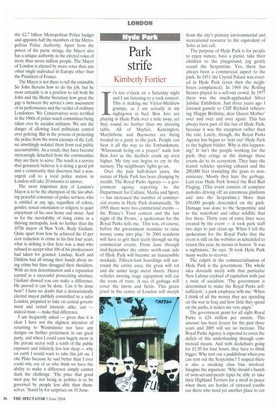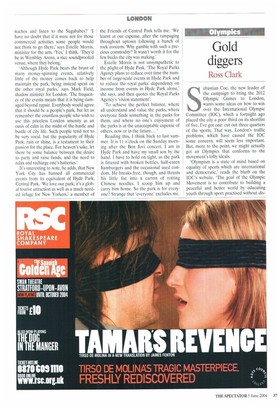Park strife
Kimberly Fortier
It's ten o'clock on a Saturday night and I am listening to a rock concert. This is making me Victor-Meldrew grumpy, as I am actually in my nightgown in bed. Bon Jovi are playing in Hyde Park over a mile away, yet they sound no further than my dressing table. All of Mayfair, Kensington, Marylebone and Bayswater are being treated to a party in the park. People can hear it all the way to the Embankment. 'Wh0000ah living on a prayer!' wails Jon Bon Jovi as the decibels crank up even higher. My tiny son begins to cry in the nursery. The neighbours' lights go on.
Over the past half-dozen years, the nature of Hyde Park has been changing by stealth. The Royal Parks Agency — a government agency reporting to the Department for Culture, Media and Sport, — has increased the number of commercial events in Hyde Park dramatically. 'In 1995 there were two commercial events — the Prince's Trust concert and the last night of the Proms,' a spokesman for the Royal Parks tells me. 'This was, of course, before the government mandate to raise money came into play.' In 2004 residents will have to grit their teeth through six big commercial events. From June through mid-September the entire north-east side of Hyde Park will become an inaccessible stockade. Fifteen-foot hoardings will surround the entire area; the grass will rot and die under large metal sheets. Heavy vehicles moving stage equipment will cut the roots of trees. A sea of garbage will cover the lawns and fields. This green jewel in the centre of London will morph from the city's primary environmental and recreational resource to the equivalent of Soho at last call.
The purpose of Hyde Park is for people to enjoy nature, have a picnic, take their children to the playground, jog gently round the Serpentine. Yes, there has always been a commercial aspect to the park. In 1851 the Crystal Palace was erected in Hyde Park (even then the neighbours complained). In 1969 the Rolling Stones played to a sell-out crowd. In 1977 there was the much-applauded Silver Jubilee Exhibition. Just three years ago I listened gamely to Cliff Richard rehearsing 'Happy Birthday, dear Queen Mother' over and over and over again. This has always been part of the fun of Hyde Park, because it was the exception rather than the rule. Lately, though, the Royal Parks Agency has begun to 'rent out' Hyde Park to the highest bidder. Why is this happening? It isn't the people working for the park: they cringe at the damage these events do to its ecosystem. They hate the transit vehicles spewing exhaust and the 200,000 feet trampling the grass to nonexistence. Mostly they hate the garbage. Last year Hyde Park hosted the Red Bull Flugtag. (This event consists of complete assholes driving off an enormous platform and into the Serpentine.) More than 150,000 people descended on the park. Damage was done to the Serpentine and to the waterfowl and other wildlife that live there. Thirty tons of extra litter were created by the event — it took park staff two days to just clean up. When I tell the spokesman for the Royal Parks that the event is still on the websites as scheduled to return this year, he moans in horror. 'It was a nightmare,' he says. 'It took Hyde Park many weeks to recover.'
The culprit in the commercialisation of Hyde Park is the government. The whole idea dovetails nicely with that particular New Labour cocktail of capitalism with just a twist of socialism. 'The government is determined to make the Royal Parks selfsufficient,' a park employee tells me. 'When I think of all the money they are spending on the war in Iraq and how little they spend on the parks, it makes me very angry.'
The government grant for all eight Royal Parks is £24 million per annum. This amount has been frozen for the past three years and 2005 will see no increase. The Royal Parks Agency is expected to cover the deficit of this underfunding through commercial means. And with deckchairs going for £1.50 for four hours, they have to think bigger. Why rent out a paddleboat when you can rent out the Serpentine? I suspect there is also a sneaking class bias involved. Imagine the argument: 'Why should a bunch of twin-set-and-pearls types be able to take their Highland Terriers for a stroll in peace when there are hordes of tattooed youths out there who need yet another place to eat nachos and listen to the Sugababes?"I have no doubt that if it were not for those commercial activities some people would not think to go there,' says Estelle Morris, minister for the arts. 'Yes,' I think. 'They'd be in Wembley Arena, a nice soundproofed venue, where they belong.'
'Although Hyde Park bears the brunt of many money-spinning events, relatively little of the money comes back to help maintain the park, being instead spent on the other royal parks,' says Mark Field, shadow minister for London. 'The frequency of the events means that it is being damaged beyond repair. Everybody would agree that it should be a people's park, but let us remember the countless people who wish to use this priceless London amenity as an oasis of calm in the midst of the hustle and bustle of city life. Such people tend not to be very vocal, but the popularity of Hyde Park, rain or shine, is a testament to their passion for the place. For heaven's sake, let there be some balance between the desire to party and raise funds, and the need to relax and recharge one's batteries.'
It's interesting to note, he adds, that New York City has banned all commercial events from its equivalent of Hyde Park, Central Park. 'We love our park; it's a global tourist attraction as well as a much needed refuge for New Yorkers,' a member of the Friends of Central Park tells me. `We learnt at our expense, after the rampaging throughout uptown following a bunch of rock concerts. Why gamble with such a precious commodity? It wasn't worth it for the few bucks the city was making.'
Estelle Morris is not unsympathetic to the plight of Hyde Park. 'The Royal Parks Agency plans to reduce over time the number of large-scale events in Hyde Park and to reduce the royal parks' dependency on income from events in Hyde Park alone,' she says, and then quotes the Royal Parks Agency's 'vision statement': 'To achieve the perfect balance, where all understand and value the parks, where everyone finds something in the parks for them, and where no one's enjoyment of the parks is at the unacceptable expense of others, now or in the future...'
Reading this, I think back to last summer. It is 11 o'clock on the Sunday morning after the Bon Jovi concert. I am in Hyde Park and have my small son by the hand. I have to hold on tight, as the park is littered with broken bottles, half-eaten hamburgers and the occasional used condom. He breaks free, though, and thrusts his little fist into a carton of rotting Chinese noodles. I scoop him up and carry him home. So the park is for everyone? Strange that 'everyone' excludes me.











































































 Previous page
Previous page